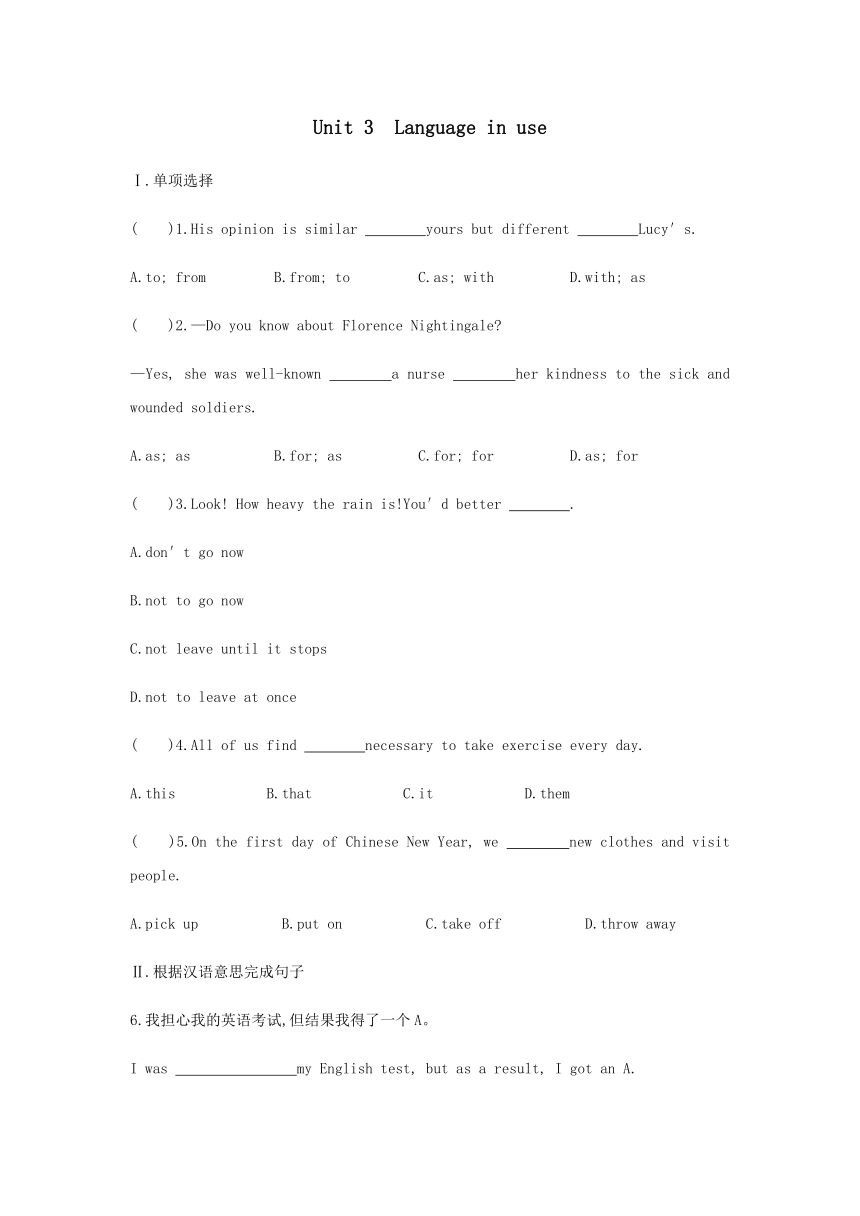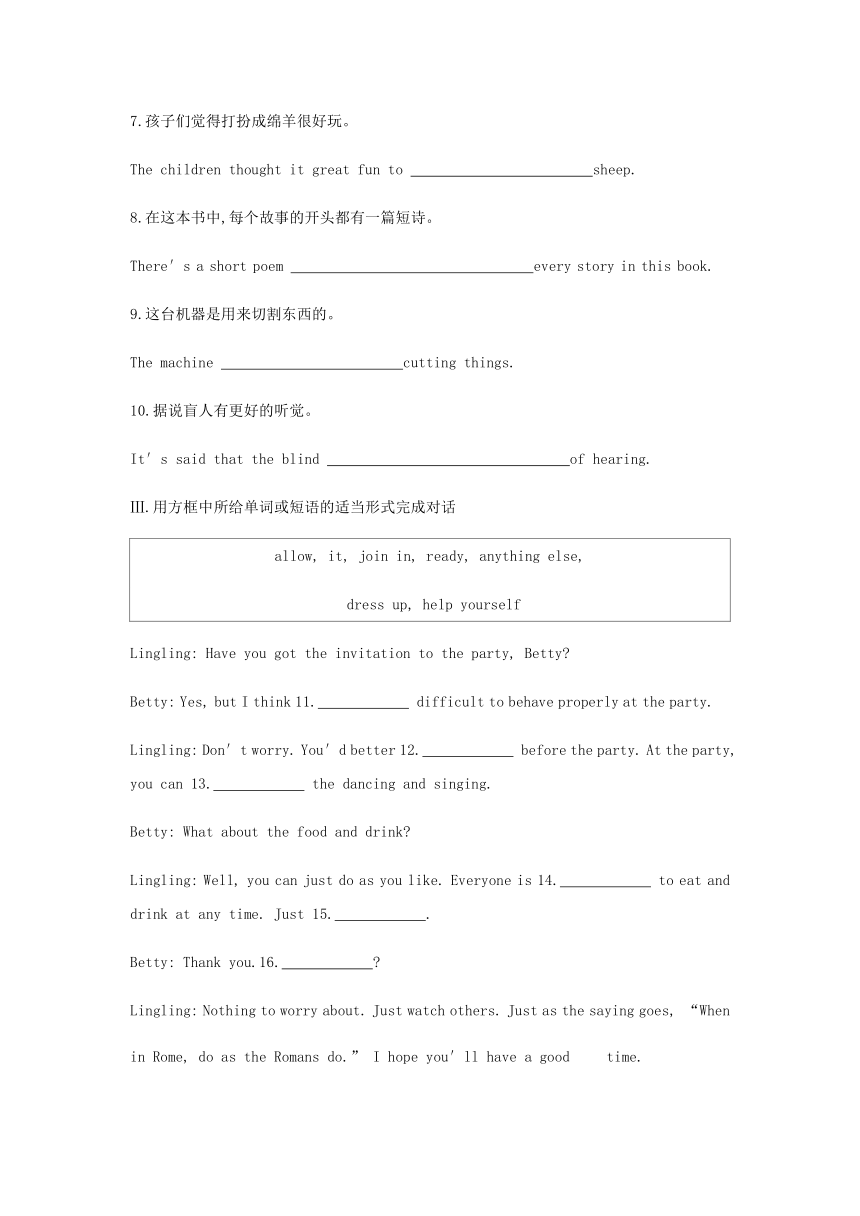外研版九年级英语下册Module 6 Unit 3 Language in use同步练习(含答案)
文档属性
| 名称 | 外研版九年级英语下册Module 6 Unit 3 Language in use同步练习(含答案) |  | |
| 格式 | docx | ||
| 文件大小 | 28.7KB | ||
| 资源类型 | 教案 | ||
| 版本资源 | 外研版 | ||
| 科目 | 英语 | ||
| 更新时间 | 2020-11-17 11:53:22 | ||
图片预览


文档简介
Unit
3 Language
in
use
Ⅰ.单项选择
( )1.His
opinion
is
similar
yours
but
different
Lucy′s.?
A.to;
from
B.from;
to
C.as;
with
D.with;
as
( )2.—Do
you
know
about
Florence
Nightingale?
—Yes,
she
was
well-known
a
nurse
her
kindness
to
the
sick
and
wounded
soldiers.?
A.as;
as
B.for;
as
C.for;
for
D.as;
for
( )3.Look!
How
heavy
the
rain
is!You′d
better
.?
A.don′t
go
now
B.not
to
go
now
C.not
leave
until
it
stops
D.not
to
leave
at
once
( )4.All
of
us
find
necessary
to
take
exercise
every
day.?
A.this
B.that
C.it
D.them
( )5.On
the
first
day
of
Chinese
New
Year,
we
new
clothes
and
visit
people.?
A.pick
up
B.put
on
C.take
off
D.throw
away
Ⅱ.根据汉语意思完成句子
6.我担心我的英语考试,但结果我得了一个A。
I
was
my
English
test,
but
as
a
result,
I
got
an
A.?
7.孩子们觉得打扮成绵羊很好玩。
The
children
thought
it
great
fun
to
sheep.?
8.在这本书中,每个故事的开头都有一篇短诗。
There′s
a
short
poem
every
story
in
this
book.?
9.这台机器是用来切割东西的。
The
machine
cutting
things.?
10.据说盲人有更好的听觉。
It′s
said
that
the
blind
of
hearing.?
Ⅲ.用方框中所给单词或短语的适当形式完成对话
allow,
it,
join
in,
ready,
anything
else,
dress
up,
help
yourself
Lingling:
Have
you
got
the
invitation
to
the
party,
Betty?
Betty:
Yes,
but
I
think
11.
difficult
to
behave
properly
at
the
party.?
Lingling:
Don′t
worry.
You′d
better
12.
before
the
party.
At
the
party,
you
can
13.
the
dancing
and
singing.
?
Betty:
What
about
the
food
and
drink?
Lingling:
Well,
you
can
just
do
as
you
like.
Everyone
is
14.
to
eat
and
drink
at
any
time.
Just
15. .
?
Betty:
Thank
you.16. ??
Lingling:
Nothing
to
worry
about.
Just
watch
others.
Just
as
the
saying
goes,
“When
in
Rome,
do
as
the
Romans
do.”
I
hope
you′ll
have
a
good
time.
Betty:
Thanks.
I
think
I′m
17.
for
the
wonderful
time.?
Ⅳ.语法填空
阅读下面短文,
在空白处填入一个适当的词,
或填入括号中所给单词的正确形式。
In
most
cultures,
when
you
meet
people
for
the
first
time,
it
is
usual
to
greet
18. (they).
Once
a
young
woman
from
England
went
to
Hong
Kong
to
work.
When
she
first
arrived,
she
knew
little
19.
the
Chinese
culture.
On
her
way
to
school
one
day,
she
went
to
a
bank
20. (get)
some
money.
To
her
surprise,
the
bank
clerk
asked
her
21.
she
had
had
her
lunch.
She
was
22. (surprise)
at
such
a
question
because
in
the
British
culture
it
would
mean
an
invitation
to
lunch.
Between
unmarried
young
people
it
can
also
mean
the
young
man′s
interest
in
dating
the
girl.
Since
this
bank
clerk
was
a
23. (strange)
to
the
British
woman,
she
was
very
puzzled
and
quickly
answered
that
she
had
eaten
already.
After
this
she
went
on
to
school
and
was
even
more
surprised
when
one
of
the
teachers
asked
her
24.
same
question.
?
By
now
she
had
understood
that
it
could
not
be
an
invitation
but
was
puzzled
why
they
asked
it.
In
the
following
days,
she
was
asked
the
same
question
again
25.
again.
And
she
spent
many
hours
26. (try)
to
work
out
why
so
many
people
kept
asking
this.
At
last
she
thought
that
these
people
must
be
concerned
(关心的)
about
27. (she)
health.
She
was
rather
thin
at
that
time
and
she
thought
they
must
be
worrying
that
she
was
not
eating
well.
?
答案
Unit
3 Language
in
use
Ⅰ.1.A be
similar
to意为“与……相似”;be
different
from意为“与……不同”。
2.D be
well-known
as意为“作为……出名”,后跟职业名词;be
well-known
for意为“因……出名”,后接出名的原因。
3.C
4.C “find
it+形容词+to
do
sth.”表示“发现做某事是……的”,it作形式宾语,真正的宾语是不定式短语。
5.B 考查动词短语辨析。句意:在中国新年的第一天,我们穿上新衣服去拜访人们。pick
up意为“捡起,拾起”;put
on意为“穿上”;take
off意为“脱下”;throw
away意为“扔掉”。由常识可知,大年初一,都要穿上新衣服走亲访友,故选B。
Ⅱ.6.worried
about
7.dress
up
as
8.at
the
start/beginning
of
9.is
used
for
10.have
a
better
sense
Ⅲ.11.it
12.dress
up
13.join
in
14.allowed
15.help
yourself
16.Anything
else
17.ready
Ⅳ.18.them
19.about
20.to
get
21.if/whether
22.surprised
23.stranger
24.the
25.and
26.trying
27.her
3 Language
in
use
Ⅰ.单项选择
( )1.His
opinion
is
similar
yours
but
different
Lucy′s.?
A.to;
from
B.from;
to
C.as;
with
D.with;
as
( )2.—Do
you
know
about
Florence
Nightingale?
—Yes,
she
was
well-known
a
nurse
her
kindness
to
the
sick
and
wounded
soldiers.?
A.as;
as
B.for;
as
C.for;
for
D.as;
for
( )3.Look!
How
heavy
the
rain
is!You′d
better
.?
A.don′t
go
now
B.not
to
go
now
C.not
leave
until
it
stops
D.not
to
leave
at
once
( )4.All
of
us
find
necessary
to
take
exercise
every
day.?
A.this
B.that
C.it
D.them
( )5.On
the
first
day
of
Chinese
New
Year,
we
new
clothes
and
visit
people.?
A.pick
up
B.put
on
C.take
off
D.throw
away
Ⅱ.根据汉语意思完成句子
6.我担心我的英语考试,但结果我得了一个A。
I
was
my
English
test,
but
as
a
result,
I
got
an
A.?
7.孩子们觉得打扮成绵羊很好玩。
The
children
thought
it
great
fun
to
sheep.?
8.在这本书中,每个故事的开头都有一篇短诗。
There′s
a
short
poem
every
story
in
this
book.?
9.这台机器是用来切割东西的。
The
machine
cutting
things.?
10.据说盲人有更好的听觉。
It′s
said
that
the
blind
of
hearing.?
Ⅲ.用方框中所给单词或短语的适当形式完成对话
allow,
it,
join
in,
ready,
anything
else,
dress
up,
help
yourself
Lingling:
Have
you
got
the
invitation
to
the
party,
Betty?
Betty:
Yes,
but
I
think
11.
difficult
to
behave
properly
at
the
party.?
Lingling:
Don′t
worry.
You′d
better
12.
before
the
party.
At
the
party,
you
can
13.
the
dancing
and
singing.
?
Betty:
What
about
the
food
and
drink?
Lingling:
Well,
you
can
just
do
as
you
like.
Everyone
is
14.
to
eat
and
drink
at
any
time.
Just
15. .
?
Betty:
Thank
you.16. ??
Lingling:
Nothing
to
worry
about.
Just
watch
others.
Just
as
the
saying
goes,
“When
in
Rome,
do
as
the
Romans
do.”
I
hope
you′ll
have
a
good
time.
Betty:
Thanks.
I
think
I′m
17.
for
the
wonderful
time.?
Ⅳ.语法填空
阅读下面短文,
在空白处填入一个适当的词,
或填入括号中所给单词的正确形式。
In
most
cultures,
when
you
meet
people
for
the
first
time,
it
is
usual
to
greet
18. (they).
Once
a
young
woman
from
England
went
to
Hong
Kong
to
work.
When
she
first
arrived,
she
knew
little
19.
the
Chinese
culture.
On
her
way
to
school
one
day,
she
went
to
a
bank
20. (get)
some
money.
To
her
surprise,
the
bank
clerk
asked
her
21.
she
had
had
her
lunch.
She
was
22. (surprise)
at
such
a
question
because
in
the
British
culture
it
would
mean
an
invitation
to
lunch.
Between
unmarried
young
people
it
can
also
mean
the
young
man′s
interest
in
dating
the
girl.
Since
this
bank
clerk
was
a
23. (strange)
to
the
British
woman,
she
was
very
puzzled
and
quickly
answered
that
she
had
eaten
already.
After
this
she
went
on
to
school
and
was
even
more
surprised
when
one
of
the
teachers
asked
her
24.
same
question.
?
By
now
she
had
understood
that
it
could
not
be
an
invitation
but
was
puzzled
why
they
asked
it.
In
the
following
days,
she
was
asked
the
same
question
again
25.
again.
And
she
spent
many
hours
26. (try)
to
work
out
why
so
many
people
kept
asking
this.
At
last
she
thought
that
these
people
must
be
concerned
(关心的)
about
27. (she)
health.
She
was
rather
thin
at
that
time
and
she
thought
they
must
be
worrying
that
she
was
not
eating
well.
?
答案
Unit
3 Language
in
use
Ⅰ.1.A be
similar
to意为“与……相似”;be
different
from意为“与……不同”。
2.D be
well-known
as意为“作为……出名”,后跟职业名词;be
well-known
for意为“因……出名”,后接出名的原因。
3.C
4.C “find
it+形容词+to
do
sth.”表示“发现做某事是……的”,it作形式宾语,真正的宾语是不定式短语。
5.B 考查动词短语辨析。句意:在中国新年的第一天,我们穿上新衣服去拜访人们。pick
up意为“捡起,拾起”;put
on意为“穿上”;take
off意为“脱下”;throw
away意为“扔掉”。由常识可知,大年初一,都要穿上新衣服走亲访友,故选B。
Ⅱ.6.worried
about
7.dress
up
as
8.at
the
start/beginning
of
9.is
used
for
10.have
a
better
sense
Ⅲ.11.it
12.dress
up
13.join
in
14.allowed
15.help
yourself
16.Anything
else
17.ready
Ⅳ.18.them
19.about
20.to
get
21.if/whether
22.surprised
23.stranger
24.the
25.and
26.trying
27.her
同课章节目录
- Module 1 Travel
- Unit 1 We toured the city by bus and by taxi
- Unit 2 It's a long story.
- Unit 3 Language in use
- Module 2 Education
- Unit 1 They don't sit in rows.
- Unit 2 What do I like best about school?
- Unit 3 Language in use
- Module 3 Life now and then
- Unit 1 They sometimes work harder.
- Unit 2 I think life is better today.
- Unit 3 Language in use.
- Module 4 Rules and suggestions
- Unit 1 You must be careful of falling stones.
- Unit 2 we must keep the camp clean.
- Unit 3 Language in use.
- Revison A
- Module 5 Look after yourself
- Unit 1 We'd better get you to hospital.
- Unit 2 Get off the sofa!
- Unit 3 Language in use.
- Module 6 Eating togethe
- Unit 1 When is the school-leavers' party?
- Unit 2 Knives and forks are used for most Western
- Unit 3 Language in use
- Module 7 English for you and me
- Unit 1 Have you ever been to an English corner?
- Unit 2 We all own English.
- Unit 3 Language in use
- Module 8 My future life
- Unit 1 Here's to our friendship and the future
- Unit 2 I know that you will be better at maths.
- Unit 3 Language in use
- Revison B
